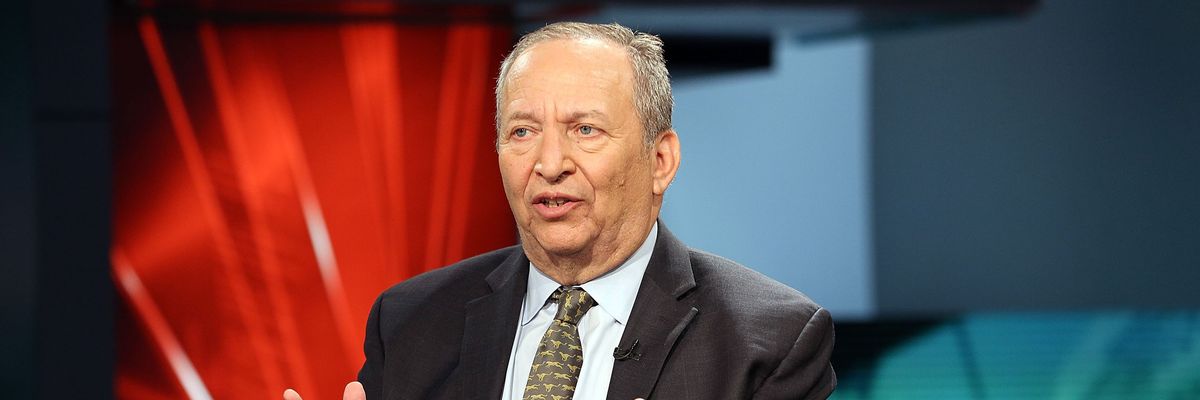News that OpenAI co-founder Sam Altman will be returning to the artificial intelligence startup just days after he was ousted by the firm's board of directors was accompanied by the announcement Tuesday of a new initial board consisting of three individuals—one of whom is the Wall Street-friendly economist and former U.S. Treasury Secretary Larry Summers.
Given Summers' record of fighting tougher regulations for risky financial instruments and—more recently—his incorrect predictions about the trajectory and stubbornness of inflation in the U.S., his elevation to the board of a company whose AI work has profound implications for the future of humanity drew immediate alarm.
The Revolving Door Project, a progressive watchdog group whose research has uncovered Summers' deep corporate ties, called his selection to the OpenAI board "awful news for humanity."
"There is no greater indication that OpenAI is unserious about the interests of humanity than their elevation of Larry Summers to its board of directors," said Jeff Hauser, the group's executive director. "Summers energetically promotes cryptocurrency, inflation hysteria, and himself with equally misplaced ardor."
Economist and journalist Nomi Prins wrote on social media that Summers "holds the top spot of those responsible for the 2008 financial crisis," alluding to his opposition to more strictly regulating financial derivatives that fueled the economic collapse.
"If AI is to be focused on human policy and care, he's a dustbin for deregulation and recklessness," Prins argued. "As president of Harvard in 2005, Summers launched a disgusting tirade on women in math and science and seemed to believe it was based on 'research in behavioral genetics.' You want Larry to be involved with steering AI forward with human consideration?"
"Summers' ascent to the heights of AI should accelerate concerns that AI will be bad for all but the richest and most opportunistic amongst us."
OpenAI's decision to reinstate Altman as CEO under a new board consisting of Summers, former Salesforce co-CEO Bret Taylor, and Quora chief executive Adam D'Angelo came less than a week after the previous board removed Altman, sparking an immediate employee revolt.
The chaotic leadership shuffle at the $90 billion company was the culmination of infighting that had been building for more than a year, with some of the tensions surrounding Altman's pursuit of commercial expansion at the potential expense of safety, according toThe New York Times.
"The tension got worse as OpenAI became a mainstream name thanks to its popular ChatGPT chatbot," the Times reported Tuesday. "At one point, Mr. Altman... made a move to push out one of the board's members because he thought a research paper she had co-written was critical of the company. Another member, Ilya Sutskever, thought Mr. Altman was not always being honest when talking with the board. And some board members worried that Mr. Altman was too focused on expansion while they wanted to balance that growth with AI safety."
Wirednoted last week that "disagreements over the issue of prioritizing safe development of AI previously led several prominent OpenAI researchers to leave the company and found competitor Anthropic."
Earlier this year, Altman joined a number of industry leaders in signing a letter declaring that "mitigating the risk of extinction from AI should be a global priority alongside other societal-scale risks such as pandemics and nuclear war." But researchers have warned that the guardrails put in place at OpenAI are badly inadequate, particularly given the current regulatory vacuum in the U.S.
Last month, U.S. President Joe Biden signed an executive order aimed at bolstering AI safety standards, a move that watchdogs welcomed as a positive first step that must be followed by more ambitious action.
It's unclear precisely what influence Summers will have on the direction of OpenAI or artificial intelligence development more broadly.
As Bloomberg observed Wednesday, "The few comments he has made about AI have centered on the labor impact."
"In 2018, Summers disputed the claims from then-Treasury Secretary Steve Mnuchin that AI would not replace American jobs for 50 to 100 years," Bloomberg noted. "The robots are coming,' Summers wrote in The Washington Post. That year, he also warned of economic catastrophe if the U.S. 'loses its lead' in biotech and AI to China."
Last year, Summers told Bloomberg TV that "we are living in truly historic times" and said the AI revolution carries "opportunities and threats," adding that there's "no assurance at all" that advances in artificial intelligence will usher in progressive outcomes.
Critics suggested that with Summers involved in the management of OpenAI, the chances of guardrails operating in the public interest, as opposed to corporate profits and dominance, are worse.
"Summers' ascent to the heights of AI should accelerate concerns that AI will be bad for all but the richest and most opportunistic amongst us," said Hauser.

